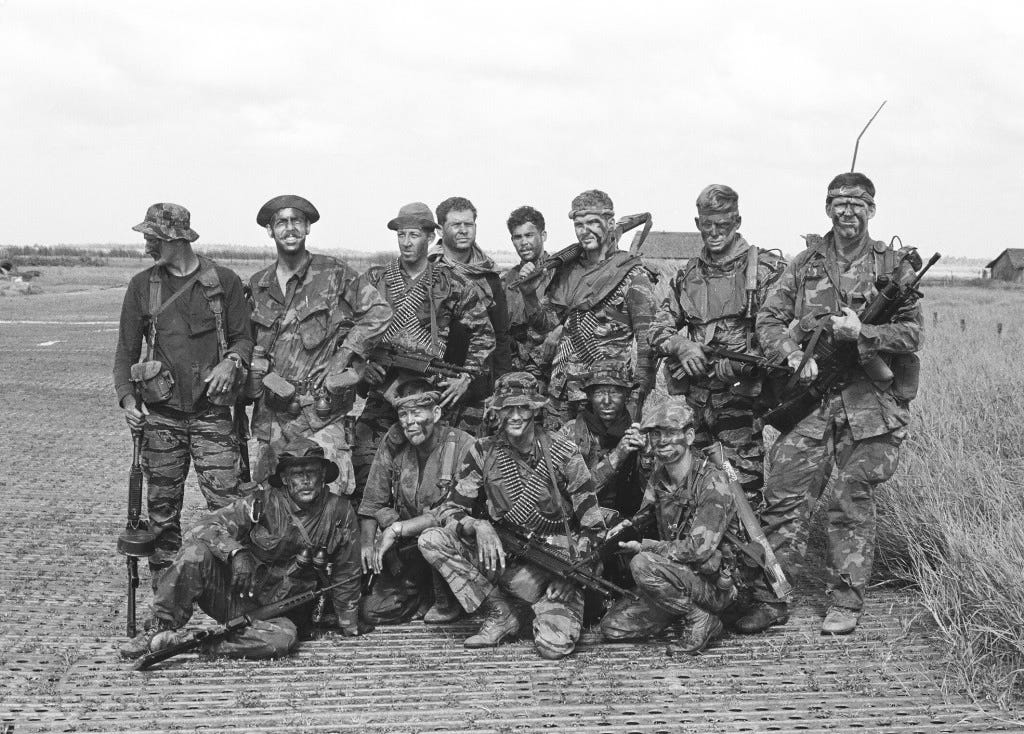In 1998, I graduated SEAL training at 19 years of age and promptly entered a culture imbued with the lessons learned of Frogmen since 1943.
Over 25 years later, I reflect on my experience of “growing up in the SEAL Teams” and how it made me into who I am today. Fortunately, I crossed paths with amazing teammates that saw potential I did not even see myself.
The collective wisdom learned clearing the beaches of Omaha and patrolling the jungles of Vietnam made it through decades of time and were instilled within me. Handed down through training that exacted my best efforts, and through stories shared in the platoon space, I was shaped through my immersion in culture rich with the intent of continuing its legacy.
In later stages of my career, I transitioned to positions in which it was my turn to train the next generation of Frogmen. I took to it wholeheartedly, driven by the echoes of those who shaped me.
Though I would consider my experience fortunate, not everyone in the Teams had it the same way.
After deployments, I’d often talk to teammates—especially junior SEALs—and hear wildly different reactions. Some would say:
“Screw this place. I can’t wait to get out. They treated me like a second-class citizen. I thought my experience would be different.”
Meanwhile, another SEAL from the same deployment—same geographic location, same mission set, but a different 20-man platoon—would say:
“Man, I had a blast. What an amazing group of guys. I learned so much, and I can’t wait to do it again.”
Two people. Same environment. Completely different experiences based on the team around them. One stays and strengthens the community. The other leaves, taking their potential impact with them.
This contrast sparked my deep interest in how developmental interactions, such as mentorship, or lack thereof, could either inspire people to stay and grow or push them away.
Later, I had the opportunity to study mentorship in special operations teams as part of my thesis research. I’ll spare you the academic details, but I will share the four principles that emerged that can help you bring mentorship into your leadership arsenal.
We coined it the R.I.S.E model of development (the military loves acronyms). See our complete model below.
Role Modeling – Setting the standard and “leading by example”.
Individualized Consideration – Taking a genuine interest in individuals.
Sounding Board – Teaching decision-making and giving people space to fail (learn!)
Empowerment – Leading by making yourself replaceable. This is the transcendent magic of mentorship!
1. Role Modeling: Setting the Standard
In the SEAL Teams, we had a saying:
“That which you allow in your presence becomes the standard.”
Great leaders don’t just talk about excellence—they embody it. Important to note that great leaders modeled the values and ethos of an organization like Keith Davids Paul Tharp . Yes, they were professionally competent and skilled, but being the primary example for excellence in character, is far more impactful.
2. Individualized Consideration: Developing People as Individuals
Leadership isn’t one-size-fits-all. Great teammates invest in people both personally and professionally. One of my mentors put it this way:
“If you don’t take the time to know someone, you’re just talking at them.”
Developing others is about truly knowing your people, understanding their strengths, guiding growth, and helping people reach their potential. Invest intentional time in your people and they will honor that with genuine appreciation and commitment. I always respected the senior leaders that took the time to know people's names and a bit about their family Dorsey Wisotzki Steve Wisotzki Anthony Baker .
3. Sounding Board: Teaching Decision-Making, Not Blind Obedience
In special operations, we thought critically, adapted under pressure, and made decisions in real time. One of our respondents told us:
“Blind obedience is not for guys like us. Leaders train others to make decisions.”
Be approachable where people can come to you to challenge assumptions, ask questions, and think creatively. Advise them and give them alternate perspectives to consider. Correct them if necessary but do not shut them down. Failure is a part of growth and one of life's best teachers.
PS: You don’t have to have all the answers. The best leaders I worked with were humble enough to say, “I don’t know, but we will figure it out.” Curt Cronin.
4. Empowerment: Leading by Making Yourself Replaceable
The best leaders don’t measure success by their personal achievements—they measure it by how well their team performs when they’re not there. This is where your leadership truly becomes transcendent @SOCM Will Guild. If you don't believe me, just take Lao Tzu’s word for it:
"A leader is best when people barely know he exists.
When his work is done, his aim fulfilled, they will say: we did it ourselves."
(Tao Te Ching, Chapter 17)
A former teammate summed it up perfectly:
“I wanted to be the team leader who could be replaced. I was trying to work myself out of a job.”
Now, get out there and lead! Share your own mentorship adventure.
If you got this far, your reward is a look at our model for a Special Operations Forces (SOF) Developer.






